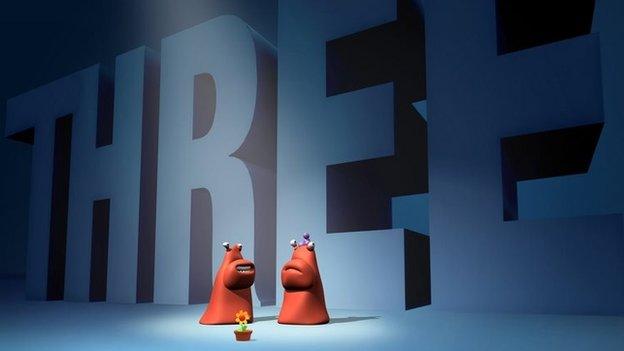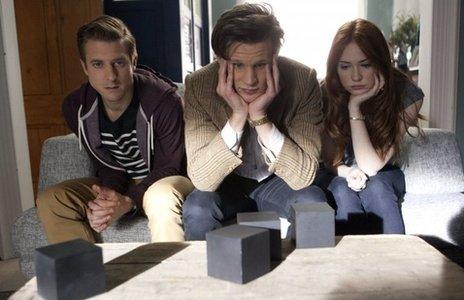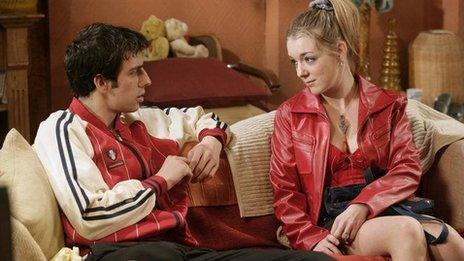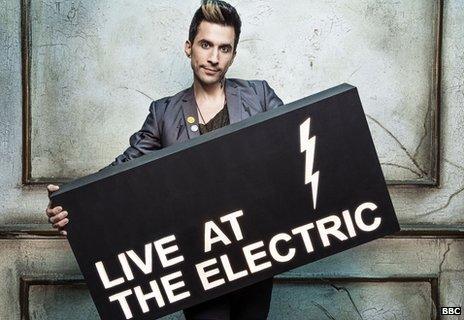BBC Three closure 'a big mistake'
- Published

BBC Three launched in 2003, with idents created by Aardman Animations
The BBC is set to close its youth-orientated TV channel BBC Three and move its content online to the iPlayer.
The details are due to be announced on Thursday, with the closure expected to contribute towards the corporation's plan to save £100m by 2016.
Director general Tony Hall has said "tough choices" lie ahead if the BBC is to meet that target.
While a campaign to save BBC Three gathers pace online, several industry experts give their opinion on the changes.
CHRIS CHIBNALL - Writer, Doctor Who and Broadchurch

Chris Chibnall has written seven episodes of Doctor Who, which is repeated on BBC Three, including the aptly-titled "Power of Three"
I think it's a bit of an own goal by the BBC.
BBC Three is a massive creative nursery slope for talent and for shows. Outside of the "big four" channels, it has a better hit rate of successful shows than Channel 5 or Sky or anyone else. It, crucially, serves a young audience, which many other parts of the BBC don't. So it's a risky decision.
Chris Chibnall tells 5 live: "It's a bit of an own goal by the BBC"
BBC One, BBC Two, BBC Four cater for a slightly older segment of the population. BBC Three is the one television service which speaks to a younger audience. So that's the channel that should be ensuring loyalty to the BBC [by] talking to those people who pay the licence fee who are under 30.
It's got a really great slate of comedies, with shows like Uncle. It's got great drama with In The Flesh. It's doing its job really well. And if you're not talking to the younger audience now, they're not going to stick around.
You're handing places like Sky a massive opportunity.
DAVID ELSTEIN - Chairman, Broadcasting Policy Group and former head of Channel 5

Two Pints of Lager and a Packet of Crisps was an early hit for the channel, launching the career of Sheridan Smith
I'm frankly quite puzzled. To close the broadcast channel but still keep making the content doesn't save you very much money, if any. And I don't believe it makes any sense to carry on spending £85m, which is BBC Three's budget, on purely online content.
If you're going to push the online experience, it doesn't make sense to do it with such narrowly-targeted content. If you're trying to push the iPlayer as a portal to a much wider experience, you want Torchwood, not Two Pints of Lager and a Packet of Crisps. It's a contemporary myth that only kids only go online.
To me, this is a much more symbolic step by Tony Hall. It's his way of saying: "I'm putting an end to salami slicing, we will start closing some of our overstretched services."
I think this is "step one" of a two-step process, which is eventually to reduce BBC Three to a residual presence online: The library and a couple of new shows every so often.
CHRIS CURTIS - Editor, Broadcast magazine
From the outset, Tony Hall has made it pretty clear that the iPlayer is right up there in his top priorities. The idea is the iPlayer will become a gateway - "the front door" is the phrase he uses - to BBC content in the future. And one way you can supercharge iPlayer is to put a whole load of exclusive, shiny new BBC content up there which isn't available elsewhere.
The big debate here is: Is this driven by strategy or is it driven by savings? Is the BBC doing this to save £100 million or because they believe it is the best way to build relationships with young people who'll go on to become devotees of the BBC?
It's a huge step and I think the BBC will have its job cut out to sell this to viewers and to the industry.
RUSSELL KANE - comedian and BBC Three presenter

Russell Kane presents comedy show Live at the Electric and Staying in with Greg and Russell on BBC Three
Everyone puts in £145 for their licence fee, everyone should be entertained and BBC Three is an important part of entertaining.
It's not necessarily a youth channel but it is younger-skewed and I don't see why that should be cut just because sometimes people who are younger have quieter voices in the democratic process.
Russell Kane tells 5 live: "BBC Three provides a vital part of the entertainment portfolio of the BBC"
There aren't [any] easy decisions when cuts have to be made. I'm not silly, I understand that. But it seems to me that if a channel is put just online it's not getting the same rubber stamp of approval from the top.
Why should it be this channel? What is it about the content of this channel that doesn't deserve the same respect as the other channels? You get into a messy area of who gets to decide what people watch.
BBC Three does some great things around debate. We're trying to engage people in the political process. Those type of things become really hard once you're an online entity.
GRAHAM SMITH - head of TV consultancy Grand Scheme Media
I'm a big supporter and a big fan of BBC Three. The TV landscape would be less interesting, less exciting, less attractive and less informative had BBC Three not been there.
But if you put that content into an online service, iPlayer, that doesn't even have "BBC" in its title, that dilutes the chance of an audience having any brand loyalty to the BBC.
Interestingly, Channel 4 did something similar when they cut shows like T4. Until then, they'd created a very strong brand loyalty by hooking people into the channel at a young age. That has now evaporated. The fear is the same is going to happen with BBC Three.
I think it is a fundamental mistake.
STEVE HEWLETT - Presenter, The Media Show
You could argue that if any part of the BBC's audience can be guided online it would be BBC Three's. They're sort of there anyway - but BBC Four's audience would find it harder.
But you have to remember what happened with 6 Music, a service very few people listened to. The mere act of putting it up for closure turned it into a national icon.
The public want the BBC to be more efficient but they don't want it to cut services.
This is as much about positioning as anything else. It's saying to the government you can't keep cutting the licence fee in real terms and expect to get away with it.
But viewers and listeners, licence payers, will not take kindly to it.
- Published5 March 2014
- Published5 March 2014
- Published8 February 2013